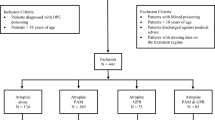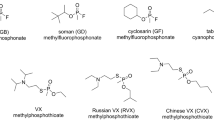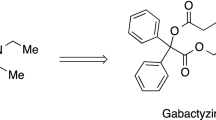Abstract
Organophosphorus (OP) nerve agents are still used as warfare and terrorism compounds. Classical delayed treatment of victims of organophosphate poisoning includes combined i.v. administration of a cholinesterase reactivator (an oxime), a muscarinic cholinergic receptor antagonist (atropine) and a benzodiazepine anticonvulsant (diazepam). The objective of this study was to evaluate, in a realistic setting, the therapeutic benefit of administration of GK-11 (gacyclidine), an antiglutamatergic compound, as a complement to the above therapy against organophosphate poisoning. Gacyclidine was injected (i.v.) in combination with atropine/diazepam/pralidoxime at man-equivalent doses after a 45- or 30-min latency period to intoxicated primates (2 LD50). The effects of gacyclidine on the animals' survival, electroencephalographic (EEG) activity, signs of toxicity, recovery after challenge and central nervous system histology were examined. The present data demonstrated that atropine/diazepam/pralidoxime alone or combined with gacyclidine did not prevent signs of soman toxicity when treatment was delayed 45 min after poisoning. Atropine/diazepam/pralidoxime also did not control seizures or prevent neuropathology in primates exhibiting severe signs of poisoning when treatment was commenced 30 min after intoxication. However, in this latter case, EEG recordings revealed that additional treatment with gacyclidine was able to stop soman-induced seizures and restore normal EEG activity. This drug also totally prevented the neuropathology observed 5 weeks after soman exposure in animals treated with atropine/diazepam/pralidoxime alone. Overall, in the case of severe OP-poisoning, gacyclidine represents a promising adjuvant therapy to the currently available polymedication to ensure optimal management of organophosphate poisoning in man. This drug is presently being evaluated in a human clinical trial for a different neuroprotective indication. However, it should always be kept in mind that, in the case of severe OP-poisoning, medical intervention must be conducted as early as possible.
Similar content being viewed by others
Author information
Authors and Affiliations
Additional information
Received: 30 November 1998 / Accepted: 12 January 1999
Rights and permissions
About this article
Cite this article
Lallement, G., Clarençon, D., Galonnier, M. et al. Acute soman poisoning in primates neither pretreated nor receiving immediate therapy: value of gacyclidine (GK-11) in delayed medical support. Arch Toxicol 73, 115–122 (1999). https://doi.org/10.1007/s002040050595
Issue Date:
DOI: https://doi.org/10.1007/s002040050595




